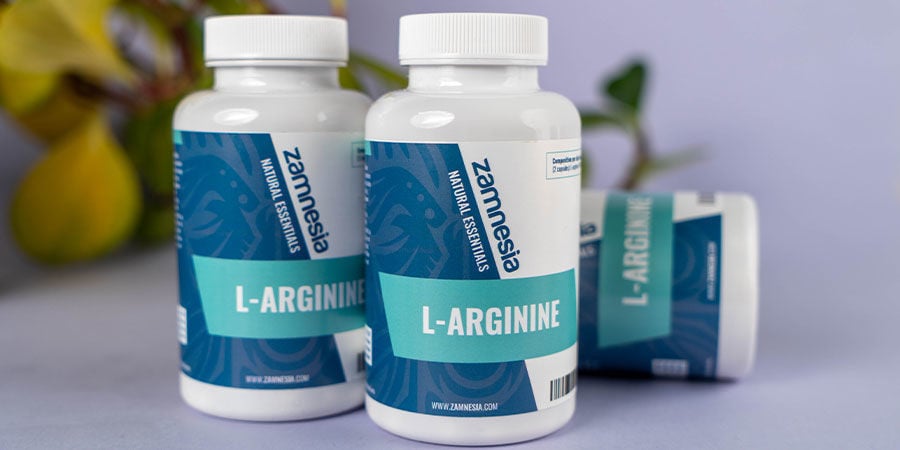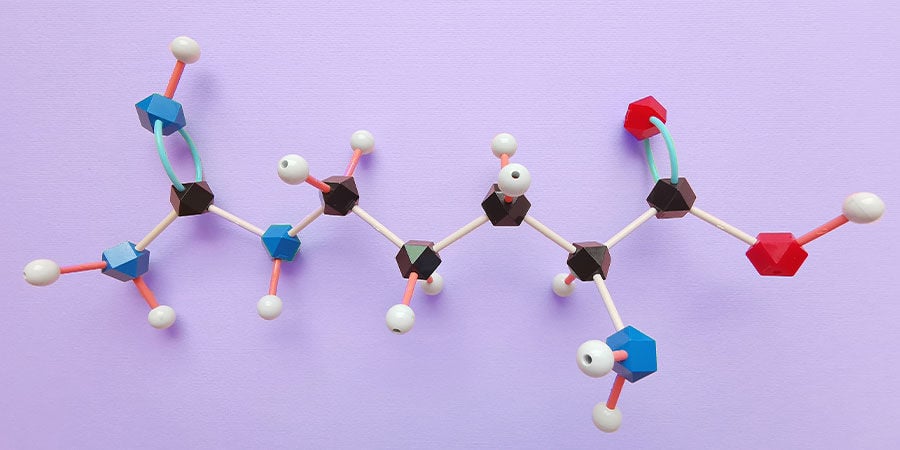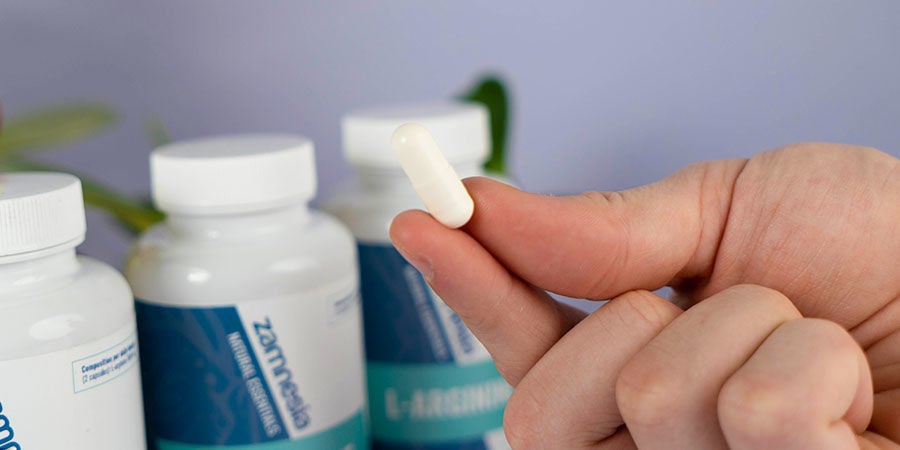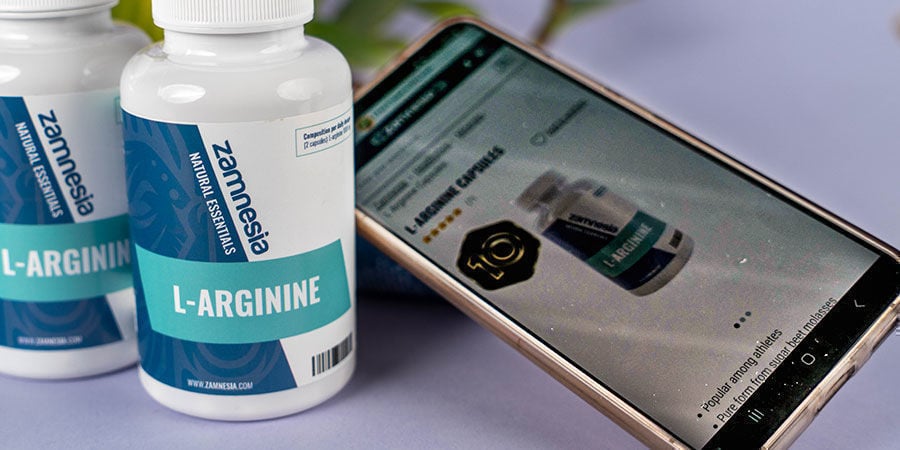
What Can L-Arginine Do For You?
This semi-essential amino acid is crucial for tissue production and repair, cell signalling, and the control of oxygen levels in the blood. Found in protein-rich foods and available as a supplement, find out all about L-arginine here.
In order to function properly, the body needs an array of nutrients and compounds. For many people, a healthy diet is enough to satisfy these requirements. But in some cases, supplementation is essential. In this article, we're examining L-arginine—an amino acid found in protein-rich foods that helps our cells to communicate and allows the body to build new tissue. In most cases, people receive enough L-arginine from food. There are, however, certain circumstances in which additional L-arginine must be supplemented, which we will explain in further detail below.
Read on to find out all about L-arginine.
What is L-arginine?

L-arginine is known as a semi-essential or conditionally essential amino acid.
Essential amino acids are those that our body cannot produce itself, and therefore must be sourced through dietary intake. Non-essential amino acids are those that our body is capable of producing itself, and as such needn’t be included in our diet.
So what about semi-essential amino acids? These are amino acids that are necessary to include in our diet during certain periods or conditions, such as pregnancy, infancy, or physical trauma. For instance, those who have suffered wounds may be given L-arginine supplements to help them recover.
How does L-arginine work in the body?

The body uses L-arginine to build muscle fibres and tissues, including in the heart. This is why it is often given to patients who suffer physical trauma.
It is also used endogenously to create nitric oxide. This compound is a gaseous signalling molecule used by the body to communicate between cells. Among other functions, it is known to play a role in controlling blood flow and blood pressure.
Interesting fact: nasal breathing causes the body to create nitric oxide, while oral breathing does not.
What are the potential benefits of L-arginine?

L-arginine has several potential benefits, some of which are supported by a wealth of evidence, and others of which are a little more dubious. When taking any supplement, it’s important to remember that they are not a substitute for a healthy and balanced lifestyle, and thus their effects may be subtle.
Blood pressure
By helping the body create nitric oxide, it is thought that L-arginine might be able to play a role in lowering blood pressure.
A 2016 review found that L-arginine affected both systolic and diastolic blood pressure (McRae, 2016). This review looked into seven different studies and concluded that both intravenous and oral application of L-arginine had the potential to affect blood pressure in those who suffered from high blood pressure.
Athletic performance
Due to the increased concentration of nitric oxide as a consequence of L-arginine intake, some athletes choose to use it in hopes of boosting performance. It is thought that L-arginine can cause more blood and oxygen to flow to the muscles, potentially increasing their capabilities.
However, evidence is limited as to the efficacy of taking L-arginine to improve athletic performance. A double-blind, randomised study found evidence that L-arginine could positively affect athletic performance in healthy men (Pahlavani et al., 2017), but on the whole, research has found little in the way of significant evidence to support these findings.
Recovery and management of illness
Although the body can usually produce enough L-arginine for itself when healthy, it is unable to meet this need when the body is recovering from serious physical trauma or illness.
As such, it must be sourced externally. It is not unusual for patients to be given oral or intravenous L-arginine supplements after surgery, or after sustaining serious injuries. Likewise, L-arginine depletion during these periods can have serious effects and reduce a person’s ability to recover.
Erectile dysfunction
In 2019, a review was conducted of 10 studies (Rhim et al.). It found that in men with mild to moderate erectile dysfunction, L-arginine application had statistically significant effects. Doses ranging from 1,500–5,000mg appeared to be effective.
Diabetes
Research suggests that long-term use of L-arginine may be able to affect the occurrence of diabetes in at-risk populations (Monti et al., 2017).
One of nitric oxide’s uses as a signaller is to tell your body how to respond to insulin. As such, it is thought that by increasing levels of nitric oxide, the body might be able to better secrete and better use insulin, improving the way that it is able to transport blood sugar around the body.
Healthshop
Our new Healthshop stocks a wide range of supplements and natural products to help you lead the healthy life you've always wanted.
Is L-arginine safe to use?

On the whole, L-arginine is thought to be very safe to use. That being said, it shouldn’t be taken in large amounts, so sticking to guidelines is very important. For reference, humans tend to consume around 4–6 grams of L-arginine per day through a healthy diet.
Those who suffer from any of the following conditions should avoid L-arginine:
- Asthma
- Cirrhosis of the liver
- Kidney disease
- Low blood pressure
- Guanidinoacetate methyltransferase deficiency
Are there any side effects associated with L-arginine?
L-arginine can produce some unpleasant side effects. These are more likely to occur in those who take above 9 grams a day.
Side effects include:
- Bloating
- Abdominal pain
- Nausea
- Diarrhoea
Where can you experience L-arginine for yourself?

L-arginine is pretty common and can be found in many foods. It is found in typically nutrient-rich foods, such as meat, poultry, dairy, nuts, soy, and fish. For most healthy people, a balanced diet should provide ample amounts of L-arginine.
For those who think they could do with a little help increasing their L-arginine intake, there are a range of supplements available. Over at the Zamnesia Healthshop, we offer L-arginine capsules that are convenient and easy to take. Our capsules are made from sugar beet molasses, meaning that they don’t contain any synthetic ingredients!
- Marc P. McRae. (2016, September). Therapeutic Benefits of l-Arginine: An Umbrella Review of Meta-analyses - https://www.ncbi.nlm.nih.gov
- Monti, Lucilla D., Galluccio, Elena, Villa, Valentina, Fontana, Barbara, Spadoni, Serena, Piatti, & Pier Marco. (2018, December). Decreased diabetes risk over 9 year after 18-month oral l-arginine treatment in middle-aged subjects with impaired glucose tolerance and metabolic syndrome (extension evaluation of l-arginine study) - https://link.springer.com
- Pahlavani N, Entezari MH, Nasiri M, Miri A, Rezaie M, Bagheri-Bidakhavidi M, & Sadeghi O. (2017 Apr). The effect of l-arginine supplementation on body composition and performance in male athletes: a double-blinded randomized clinical trial - https://pubmed.ncbi.nlm.nih.gov
- Rhim, H. C., Kim, M. S., Park, Y. J., Choi, W. S., Park, H. K., Kim, H. G., Kim, A., & Paick, S. H. (2019). The Potential Role of Arginine Supplements on Erectile Dysfunction: A Systemic Review and Meta-Analysis - https://www.jsm.jsexmed.org
-
 5 min
23 January 2023
What You Need To Know About Tryptophan
Tryptophan is an essential amino acid that our body receives from food or supplements. According to preliminary research, boosting your intake of tryptophan could come with a variety of benefits to...
5 min
23 January 2023
What You Need To Know About Tryptophan
Tryptophan is an essential amino acid that our body receives from food or supplements. According to preliminary research, boosting your intake of tryptophan could come with a variety of benefits to...
-
 4 min
3 November 2022
5-HTP: Everything You Need To Know
As a supplement, the use of 5-HTP has increased dramatically over the years. While the body naturally produces this chemical, many are looking to increase systemic levels in hopes of experiencing...
4 min
3 November 2022
5-HTP: Everything You Need To Know
As a supplement, the use of 5-HTP has increased dramatically over the years. While the body naturally produces this chemical, many are looking to increase systemic levels in hopes of experiencing...













 United States
United States











